#Atlanta Spa Shootings (2021)
Explore tagged Tumblr posts
Text
Since entering Georgia politics in 2020, state Rep. Michelle Au has been called every name in the book: Chinese spy, foreign plant, “agent of the Chinese Communist Party.”
Au recalled this experience in March as she pushed back against a bill to ban “agents“ of China and other “foreign adversaries“ from purchasing farmland in the state, as well as property near military installations. The bill’s mostly Republican backers argued that it would defend against national security threats; Au and other critics warned that the measure would fuel xenophobia.
“It stokes this suspicion and this sensibility that many of us face in our everyday lives—even before this type of bill was being passed—that Asian Americans and Chinese Americans in particular are perpetually foreign,” said Au, a 46-year-old anesthesiologist and a Democrat in Georgia’s House of Representatives. “We are cast under a light of suspicion that other immigrants are not.”
The bill, which was signed into law in April, reflects how concerns about China’s influence loom large in Georgia, a swing state that proved key in the 2020 U.S. presidential election and that both former President Donald Trump and Vice President Kamala Harris are desperate to win on Nov. 5. It’s not just land ownership that has raised national security concerns in the state. Georgia Tech, a top public university, recently severed a long-standing partnership with a Chinese university.
At the same time, Chinese American communities are intimately familiar with how rocky U.S.-China relations and inflammatory rhetoric can stoke hostility against Asian Americans, which surged nationwide in the wake of the COVID-19 pandemic, during Trump’s presidency. In Georgia, fears about hate crimes intensified after a gunman stormed three spas in Atlanta in 2021 and killed eight people, six of whom were Asian women.
“While attention may have moved from [the 2021 shootings], the fear that Asian Americans, Chinese Americans [feel] is still very much there,” said Marvin Lim, another Democratic state representative in Georgia. He added that these communities have long grappled with the question of where they fit in.
Georgia’s Chinese American community, which today consists of more than 80,000 people, accounts for just a slice of the state’s electorate. But it offers a window into how geopolitical pressures weigh on Chinese American voters ahead of an election partly defined by a U.S. hawkishness toward Beijing.
“Asian American voters in Georgia are the fastest-growing voting demographic and voting bloc,” said Murtaza Khwaja, the executive director of Asian Americans Advancing Justice-Atlanta, a legal advocacy group. It’s, he said, “an electorate that wants to see themselves represented and see candidates emerge from those communities.”
Georgia’s Asian American and Pacific Islander (AAPI) population has grown by more than 50 percent since 2010, with many people settling in the Atlanta-area counties of Forsyth and Gwinnett. In 2020, they made their electoral power clear. Voter turnout among the group surged by a staggering 84 percent compared to the 2016 election—an increase that helped Biden win the battleground state and the Democrats take the Senate.
Those trends were also visible nationally, as Asian Americans—a group long overlooked by both politicians and pollsters—increased their turnout by 40 percent, with most of those ballots cast for Biden. The bloc could be even more decisive this time around. Between January and June, Asian Americans logged the sharpest increase in voter registration of any racial group in the United States, compared to the same period in 2020.
“As the fastest-growing racial group in the country and also the fastest-growing electorate in this country, we are stating very clearly that elected officials can no longer take us for granted,” said Cynthia Choi, the co-founder of Stop AAPI Hate, a U.S.-based coalition. “We deserve to have our rights protected. We deserve to feel that we can establish roots in this country. We deserve to have protections and to feel safe.”
This political evolution is underway as competition with China has become one of the rare areas of bipartisan agreement in Washington. Trump spent his four years in the White House waging a trade war with China and using inflammatory language that deepened concerns about xenophobia against Chinese and Asian Americans. After taking office in 2021, President Joe Biden expanded on many of Trump’s policies with his own campaign of tariffs and tough restrictions; Harris is expected to take a similarly hawkish approach.
Chinese Americans’ voting preferences remain somewhat hazy, in part because the community is not monolithic, with deep political divisions across generations, professions, proximity to immigration, gender, and education level. Like other Asian American demographic groups, many Chinese Americans also do not have long familial traditions of voting for Republicans or Democrats, resulting in weaker party affiliation.
The AAPI community has “a lot of new American voters. We have a lot of naturalized citizens, people who maybe haven’t voted in the past,” said Au. “If you’re thinking about just the math of it, these are voters who are up for grabs.”
There are some overarching trends. Nationally, the majority of Chinese American voters lean Democratic, according to the Pew Research Center. They also largely favor Harris over Trump; A 2024 voter survey by AAPI Data found that 65 percent of Chinese American respondents backed Harris, compared to 24 percent who preferred Trump. Forty-five percent of respondents believed that Harris would do a better job dealing with China—more than double the percent that supported Trump’s approach.
The outlook is more complicated along individual issue areas. Take economic policy, which remains a top concern for Georgia’s Chinese Americans, according to Khwaja. “Many in the Chinese American community here in Georgia are small-business owners or physicians who own their practice or of the like,” he said. “The economy is an incredibly important issue for them.”
Yet Chinese American voters overall are divided on which party does a better job when it comes to economic policy. According to one survey by AAPI Data, one-third of Chinese American respondents believed Republicans had a better approach to jobs and the economy, which only slightly edged out the 31 percent who favored the Democrats and the 29 percent who felt there was no difference between the parties. One-third of Chinese American respondents also favored Republicans’ record on inflation, compared to the 26 percent who preferred that of the Democrats.
It’s also difficult to tell how U.S.-China relations will sway the vote among the demographic. Among Asian Americans, Chinese Americans are the only group in which the majority does not view their ancestral homeland favorably, according to Pew, underscoring how some voters may prefer a tough-on-China approach in this year’s election.
Fei-Ling Wang, a professor of international affairs at Georgia Tech, said that some Chinese Americans in Georgia may favor Trump because his rhetoric makes him seem tougher on Beijing than Harris—even if that’s not necessarily true in practice. “Many Chinese Americans, in my opinion, they sort of read the rhetoric more than [the] substance,” he said.
On the other hand, some voters may worry about what that kind of tough talk means for them. Nearly two-thirds of Chinese Americans believe that the current U.S.-China relationship negatively affects how they are treated, according to a recent study by the nonprofit Committee of 100 and NORC at the University of Chicago. More than 80 percent of respondents expressed concern about how both presidential candidates’ rhetoric toward China could fuel discrimination in the United States.
“The majority of domestic xenophobia and anti-Asian sentiment is driven by American foreign policy,” Khwaja said. “I think even those that would be supportive of legislation or … rhetoric critical of the Chinese government, there’s a reservation and caution of the form that it’s taken and how they themselves and their families would be targeted.”
These issues could prove pivotal on Nov. 5 in the battleground of Georgia, where polls are pointing to a thin margin between Harris and Trump; as of Oct. 16, polling averages showed Trump in the lead by around one point. Four years after Asian Americans in Georgia showed up at the polls in record numbers, those same voters may now be gearing up for another round.
“I was told as a first-time candidate, ‘Don’t bother talking to Asian voters because Asian people don’t vote,’” Au said. “I think we’re realizing that that is wrong, and people are now actively like, ‘Oh, we were sleeping on the Asian Americans. We’ve got to get them to vote for us.’”
11 notes
·
View notes
Text
Events 3.16 (after 1970)
1977 – Assassination of Kamal Jumblatt, the main leader of the anti-government forces in the Lebanese Civil War. 1978 – Former Italian Prime Minister Aldo Moro is kidnapped; he is later murdered by his captors. 1978 – A Balkan Bulgarian Airlines Tupolev Tu-134 crashes near Gabare, Bulgaria, killing 73. 1978 – Supertanker Amoco Cadiz splits in two after running aground on the Portsall Rocks, three miles off the coast of Brittany, resulting in the largest oil spill in history at that time. 1979 – Sino-Vietnamese War: The People's Liberation Army crosses the border back into China, ending the war. 1984 – William Buckley, the CIA station chief in Lebanon, is kidnapped by Hezbollah; he later dies in captivity. 1985 – Associated Press newsman Terry Anderson is taken hostage in Beirut; he is not released until December 1991. 1988 – Iran–Contra affair: Lieutenant Colonel Oliver North and Vice Admiral John Poindexter are indicted on charges of conspiracy to defraud the United States. 1988 – Halabja chemical attack: The Kurdish town of Halabja in Iraq is attacked with a mix of poison gas and nerve agents on the orders of Saddam Hussein, killing 5,000 people and injuring about 10,000 people. 1988 – The Troubles: Ulster loyalist militant Michael Stone attacks a Provisional IRA funeral in Belfast with pistols and grenades. Three persons, one of them a member of PIRA are killed, and more than 60 others are wounded. 1995 – Mississippi formally ratifies the Thirteenth Amendment to the United States Constitution, becoming the last state to approve the abolition of slavery. The Thirteenth Amendment was officially ratified in 1865. 2001 – A series of bomb blasts in the city of Shijiazhuang, China kill 108 people and injure 38 others, the biggest mass murder in China in decades. 2003 – American activist Rachel Corrie is killed in Rafah by being run over by an Israel Defense Forces bulldozer while trying to obstruct the demolition of a home. 2005 – Israel officially hands over Jericho to Palestinian control. 2010 – The Kasubi Tombs, Uganda's only cultural World Heritage Site, are destroyed in a fire. 2012 – Former Indian cricketer Sachin Tendulkar becomes the first batter in history to score 100 centuries in international cricket. 2014 – Crimea votes in a controversial referendum to secede from Ukraine to join Russia. 2016 – A bomb detonates in a bus carrying government employees in Peshawar, Pakistan, killing 15 and injuring at least 30. 2016 – Two suicide bombers detonate their explosives at a mosque during morning prayer on the outskirts of Maiduguri, Nigeria, killing 24 and injuring 18. 2020 – The Dow Jones Industrial Average falls by 2,997.10, the single largest point drop in history and the second-largest percentage drop ever at 12.93%, an even greater crash than Black Monday (1929). This follows the U.S. Federal Reserve announcing that it will cut its target interest rate to 0–0.25%. 2021 – Atlanta spa shootings: Eight people are killed and one is injured in a trio of shootings at spas in and near Atlanta, Georgia, U.S. A suspect is arrested the same day. 2022 – A 7.4-magnitude earthquake occurs off the coast of Fukushima, Japan, killing 4 people and injuring 225.
2 notes
·
View notes
Text
The Silent Struggles of Asian American Women
By: Emily Diamante
Intro
Intersectionality is when two social identities intersect, making unique situations for an individual. Women in America are faced with various difficulties ranging from the wage gap to sexual harassment. Asians in America experience discrimination, stereotyping, etc. Asian American women in this country experience all of these dangers simultaneously. My name is Emily Diamante and this blog post will briefly cover examples in history where Asian women were stereotyped and discriminated against for being both a woman and Asian.
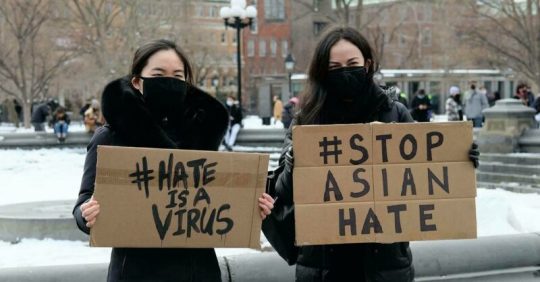
Starting from the Beginning
In 1875, the Page Act was passed. This act restricted Asian women from immigrating to the U.S for prositutional purposes. This was one of the first instances of heavy stereotyping on Asian women. With the passing of this act, this wrongly profiles Asian women as prostitutes, dehumanizing them to an object. In addition, this act prevented Asian couples from starting families. It is important to note that the fourteenth amendment states, “all persons born or naturalized in the United States”. So due to the Page Act, the exclusion of Asian women in the country prevented these couples from starting a family. This stereotype was further portrayed when it came to the idea of a “military man”. The identity of a military man was just this macho, super masculine guy. So masculine that being called anything related to feminists was considered an insult. The stereotypical Asian woman at that time is the perfect opposite of a military man. Asian women are seen as submissive, seductive, only capable of serving men.
Covid
With the COVID-19 pandemic, harmful acts of hate towards the Asian community has increased by 339% in some of the largest cities in the U.S. It is clear it is because of people’s fear, scapegoating, and misinformation that caused Asian hate to grow so much in such a short amount of time. It is also no coincidence that when President Donald Trump used phrases such as “Kung- Flu” or “China Virus” that the blame on Asian Americans got even worse. The AAPI have documented about 4,000 instances of hate with Asian women being targeted 2.3 times more than men. Asian American women have stated that they have experienced some of these situations: being called racial slurs, comments about racial stereotypes, being followed via car, accused of being dirty, and being accused of having the “China Virus”. Because of these experiences, it is no doubt that Asian Americans have felt hopeless and frustrated during this pandemic. They are disappointed with the American government for how they are being treated. Asian women fear their treatment so much to go as far as to shop in only Asian stores.
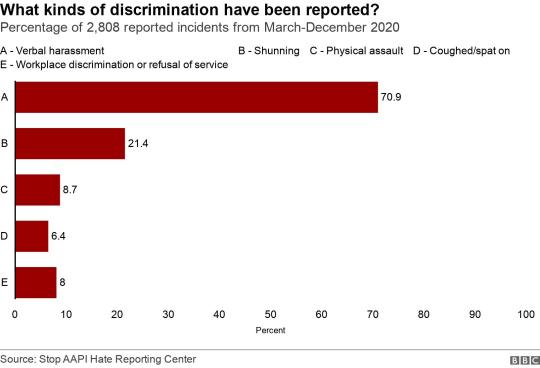
Atlanta Shooting
March 16, 2021. Robert Aaron Long attacks a massage parlor and two spas in Atlanta, Georgia. He shoots and kills eight people. All eight victims were Asian women. This tragic, targeted attack was a symbol that highlighted the intersection of racism and sexism. This act of violence represented the ongoing struggles of the objectification, fetishization, and dehumanizing experience of Asian women in America. This attack sheds light on urgent issues that need to be addressed.
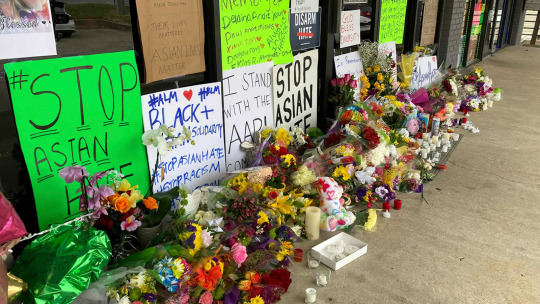
Below I provide a variety of links that talk more on this issue if you were interested:
https://www.apa.org/pubs/highlights/spotlight/issue-119
https://www.frontiersin.org/articles/10.3389/fpubh.2023.993396/full
https://www.asianwomenunited.org/
Works Cited
Lang, Cady, and Paulina Cachero. “How History Puts Asian Women in America at Risk.” Time, Time, 7 Apr. 2021, time.com/5952819/history-anti-asian-racism-misogyny/.
“Prof. Hahm & Colleagues Share First-Hand Experiences of Asian American Women Survivors of Discrimination during COVID-19.” School of Social Work Prof Hahm Colleagues Share FirstHand Experiences of Asian American Women Survivors of Discrimination During COVID19 Comments, 1 Oct. 1969, www.bu.edu/ssw/prof-hahm-colleagues-share-first-hand-experiences-asian-american-women-survivors-discrimination-during-covid-19/.
Where Sexism and Racism Meet: The Danger of Existing as an Asian ..., www.law.georgetown.edu/gender-journal/wp-content/uploads/sites/20/2022/03/I.-Oishi_Where-racism-and-sexism-meet.pdf. Accessed 19 Jan. 2024.
2 notes
·
View notes
Text
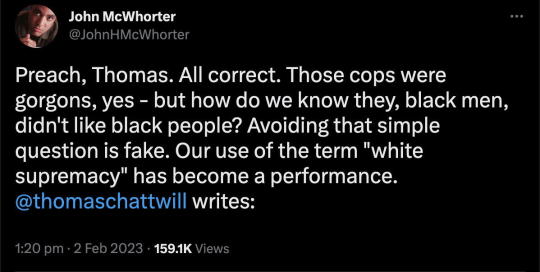
By: Thomas Chatterton Williams
Published: Feb 1, 2023
On Friday, Memphis police released body- and street-cam video of five officers beating Tyre Nichols, an unarmed civilian who later died of his injuries. Unlike many recent notorious examples of police brutality, in this instance the victim and perpetrators were all Black, leading to confusion and distress. The basketball star LeBron James tweeted, “WE ARE OUR OWN WORSE ENEMY!” This kind of self-directed criticism is familiar to anyone who has had their hair trimmed in a Black barbershop. What is novel today is the amount of anger and the specific form of critique that James’s tweet, for one prominent example, engendered. One of the more polite and re-printable responses: “i’d say white supremacy was our worse enemy but okay lebron.”
White supremacy used to refer to the belief, encoded in both custom and law, that white people sit at the top of a biological racial hierarchy and that they must remain there. But in the past decade or so, it has become a much vaguer and more totalizing concept, denoting invisible structures, latent beliefs, and even innocuous practices, such as punctuality, that supposedly maintain the comparative advantage of white people at the expense of everyone else. After the murder of George Floyd in 2020 and the period of racial reckoning that followed, all manner of experience was probed for evidence of “white supremacy.” Some on the left have adopted the term as a sort of shorthand for the the invisible hand of all American social and political life.
This understanding of white supremacy has led progressive journalists and activists to bring attention to (some might say obsess over) racial background in lethal encounters involving white and nonwhite people. George Zimmerman, who killed Trayvon Martin, was a white Hispanic. Darren Wilson, who killed Michael Brown, was not merely an agent of the state but specifically a white police officer. Derek Chauvin, a white man in a multiracial group of officers responding to the scene, was the one to kneel on George Floyd. When Robert Aaron Long, a white man, murdered eight mostly Asian workers in three massage parlors in Atlanta in 2021, he said he was a sex addict and suggested he was driven by shame. But some community leaders insisted that anti-Asian animus was the X factor. According to one media narrative, repeating Long’s professed motive amounted to making “excuses” for “white male murderers.”
For some on the left, whiteness and white supremacy retain their explanatory power even when white people are nowhere to be seen. The same year as the spa shootings, when Americans were bristling against school and business shutdowns and crime rates were spiking, nationwide hate crimes against Asian Americans surged by 339 percent. Anti-Asian violence in America has always been “a diverse and majority-minority affair,” as Wilfred Reilly wrote in 2021. “The 2019 Bureau of Justice Statistics report [found] that 27.5 percent of violent criminals targeting an Asian victim are black and only 24.1 percent are white.” Yet as video and anecdotal evidence emerged of vicious Black-on-Asian assaults and homicides, progressives wouldn’t let go of their hobbyhorse.
“Ultimately, there is a failure to remember what got America to this place of racial hierarchies and lingering Black-Asian tensions: white supremacy,” a 2021 Vox article explains. “White supremacy is what created segregation, policing, and scarcity of resources in low-income neighborhoods, as well as the creation of the ‘model minority’ myth—all of which has driven a wedge between Black and Asian communities. In fact, it is white Christian nationalism, more than any other ideology, that has shaped xenophobic and racist views around Covid-19.”
* * *
Like everyone I have spoken with, I was sickened and saddened by the killing of Tyre Nichols. When the videos were released, I was visiting my parents, and the footage was all any of us could talk about. Any attempt to make sense of the atrocity felt insufficient. My mother, an observant Christian, pointed to the existence of evil. My father, a sociologist by training, noted how power dynamics can affect, or corrupt, encounters between strangers. I stressed the role of ego and general incompetence—these officers were young, granted far too much authority, and grossly inexperienced.
Writing at CNN on Friday, Van Jones offered another explanation under the headline “The police who killed Tyre Nichols were Black. But they might still have been driven by racism.” It is certainly possible that the five young, dark-skinned men who beat Nichols so mercilessly had each internalized a poisonous self-hatred. (On Monday, the Memphis police department revealed that two other officers had been disciplined as part of the investigation, at least one of whom is white.) And there is also a serious argument to be made that racism does not require interpersonal malice but may be understood as the limited and limiting system in which individuals make free but constrained decisions. In the latter telling, the institution of American policing is foundationally derived from southern slave patrols and now operates as a disciplining force to protect capital and hold the poor and marginalized in place—all of which makes it an inherently anti-Black enterprise, regardless of the racial or ethnic makeup of the individual officers in its employ.
I am, to a degree, sympathetic to these views. I will never forget the day my brother had his front teeth separated from his mouth by the cold flashlight of a cop whose skin was darker than his own. But I am deeply skeptical of the reflex to attribute all violence and misconduct to structural racism, to impose that smooth framework on every atrocity no matter its jagged grain. I tweeted in response to Jones’s headline that we ought to at least consider the possibility that these five officers’ reprehensible actions fall on them alone.
By the next morning, that tweet had gone viral. I attempted to extend the thought further, writing, “Twitter is an amazing prism because you can watch fringe epistemologies congeal into orthodoxy in real time. A view that still strikes most as an enormous stretch—that white supremacist racism explains bad actions of non-whites even where no whites are present—is one example.”
This statement drew support as well as ire. The writer Joyce Carol Oates quoted it with a rebuttal: “yours is a somewhat disingenuous interpretation of a simple theory: that the race of the victim may determine the punishment, regardless of the race of the perpetrators. (in which case, if the victim had been white, the Black officers might have treated him less brutally.)” That tweet went viral, too, generating millions of views. Soon, my notifications were flooded with responses making a similar point, many of them quoting a specific passage from James Baldwin’s 1985 book, The Evidence of Things Not Seen:
Black policemen were another matter. We used to say, “If you just must call a policeman”—for we hardly ever did—“for God’s sake, try to make sure it’s a White one.” A Black policeman could completely demolish you. He knew far more about you than a White policeman could and you were without defenses before this Black brother in uniform whose entire reason for breathing seemed to be his hope to offer proof that, though he was Black, he was not Black like you.
Baldwin made this point with psychological acuity throughout his career. In his 1955 debut, Notes of a Native Son, he writes—eerily, in light of Memphis—“There were, incidentally, according to my brother, five Negro policemen in Atlanta at this time, who, though they were not allowed to arrest whites, would, of course, be willing, indeed, in their position, anxious, to arrest any Negro who seemed to need it. In Harlem, Negro policemen are feared even more than whites, for they have more to prove and fewer ways to prove it.”
Those were Baldwin’s insights some 40 and nearly 80 years ago, respectively, and they say something historically true with ramifications for the present. I erred on Twitter in dismissing as merely “fringe” this position—that even nonwhite actors can buy into notions of their own personal or group inferiority, and also contribute to their own structural disadvantage. And yet, is even Baldwin’s exquisite articulation really the last or even the most compelling word on what is happening between and within groups in 2023?
Americans hardly have a monopoly on brutality, or state-sanctioned brutality, such that only peculiarities of American history can explain violence in the present. We have spent the past year observing groups of white-skinned Russian men do unspeakable things to the white-skinned Ukrainians at their mercy—things most of these same men would never do by themselves—simply because they were together and they could. Strength is provocative; weakness is too. I believe that this is what my father means when he invokes power dynamics (it may also be what my mother means by evil), and it cuts across every ethnic line.
In the case of Tyre Nichols, in particular, the offending officers are Black, but so is the city’s chief of police, the majority of the force she oversees, and the community at large. The notion that the most likely explanation for this specific horror in this specific locality at this specific time ought to be reduced to a permanent, invisible, and unfalsifiable force called white supremacy veers dangerously close to determinism. Perversely, this infantilizing logic can’t help but absolve the five officers of responsibility for a heinous crime that most people and most police officers of any background do not commit.
Such moral reasoning has become conventional wisdom, embraced vocally by white liberals, among others. But white and nonwhite people alike should be wary of forfeiting their agency so easily. We should always remain skeptical of systems-level thinking that reduces the complexity and unpredictability of human action to a simple formula.
Why did those officers kill Tyre Nichols? I don’t know, and I’m wary of anyone who says they do.
[ Via: https://archive.vn/eVOYu ]
==
Presupposing the motivation for a social phenomenon is no better than academics starting with their conclusion and working backwards, or Xians and Muslims scouring their scripture for verses they can interpret as scientific "proof" of their god.
"Faith is pretending to know things you don't know."
-- Peter Boghossian
#Thomas Chatterton Williams#Tyre Nichols#white supremacy#whiteness#presupposition#systemic racism#racism#antiracism as religion#antiracism#wokeism#woke#woke activism#cult of woke#wokeness as religion#religion is a mental illness#structural racism
8 notes
·
View notes
Text
A New York City man who pleaded guilty to manslaughter and a hate crime in the 2021 killing of a Chinese immigrant has been sentenced to 22 years in prison, authorities said.
Jarrod Powell's attack on c, 61, in Manhattan's East Harlem neighborhood was one of a spate of attacks targeting Asian Americans and Pacific Islanders across the United States.
Ma was in a coma for eight months before he died. Police surveillance video of the April 2021 attack showed Ma being knocked down from behind and kicked in the head multiple times by a lone man.
Powell pleaded guilty in January to manslaughter in the first degree as a hate crime, Manhattan District Attorney Alvin Bragg's office said in a statement announcing that the 51-year-old had been sentenced to 22 years in prison.
"Mr. Ma's death was the result of a despicable racially motivated attack," Bragg said. "(No) one should have to fear that they may be in danger because of their background."
Ma was a pastry chef who came to the U.S. with his wife two years before the attack, U.S. media have reported.
Bragg's office said Powell admitted in his plea that he targeted Ma due to his Asian heritage. The office said it currently has 39 open cases related to anti-Asian hate crimes.
The attack on Ma came a month after a shooting spree at three Atlanta spas left eight people dead, including six Asian women.
About one-third of Asian Americans say they have changed their daily routines due to concerns over threats and attacks, according to a 2022 report from the Pew Research Center. The FBI says there were 305 U.S. hate crimes against Asians in 2021.
3 notes
·
View notes
Text
What Happened to Stop Asian Hate

What Happened to Stop Asian Hate: A Movement for Change
Introduction In recent years, the Stop Asian Hate movement has emerged as a significant force advocating against the rise of anti-Asian violence and discrimination. This movement gained momentum following a series of high-profile incidents that highlighted the pervasive nature of racism and xenophobia targeting Asian communities in the United States and around the world. This story delves into the origins, impact, and ongoing efforts of the Stop Asian Hate movement.
Origins of the Movement The roots of the Stop Asian Hate movement can be traced back to the early days of the COVID-19 pandemic. As the virus spread globally, misinformation and xenophobic rhetoric fueled a surge in anti-Asian sentiment. Asians and Asian Americans were scapegoated and wrongly blamed for the pandemic, leading to a dramatic increase in hate crimes and discriminatory behavior.
One of the most galvanizing incidents occurred in March 2021, when a series of shootings at three spas in Atlanta, Georgia, resulted in the deaths of eight people, six of whom were Asian women. This tragedy shocked the nation and brought the issue of anti-Asian violence to the forefront of public consciousness. Vigils, protests, and rallies were organized across the country, calling for justice for the victims and an end to the violence.
Impact of the Movement The Stop Asian Hate movement has had a profound impact on raising awareness about the discrimination and violence faced by Asian communities. Advocacy groups, community leaders, and celebrities have used their platforms to highlight personal stories of suffering and resilience, humanizing the statistics and fostering empathy.
Social media played a crucial role in amplifying the movement. Hashtags like #StopAsianHate and #ProtectAsianLives trended globally, encouraging people to share their experiences and stand in solidarity with the Asian community. This digital activism translated into tangible actions, such as increased donations to Asian advocacy organizations and greater representation of Asian voices in media and politics.
Legislative and Community Responses In response to the movement, lawmakers and local governments took steps to address the surge in anti-Asian hate crimes. In May 2021, the COVID-19 Hate Crimes Act was signed into law in the United States. This legislation aims to expedite the review of hate crimes related to the pandemic and provides support for state and local governments to improve hate crime reporting.
Community initiatives also flourished. Grassroots organizations provided support to victims, offered self-defense workshops, and created safe spaces for dialogue and healing. Educational programs were developed to combat ignorance and foster a better understanding of Asian cultures and histories.
Challenges and the Way Forward Despite the progress made, challenges remain. Hate crimes and discriminatory incidents continue to occur, and there is still much work to be done to dismantle systemic racism and promote true equality. The Stop Asian Hate movement emphasizes the importance of allyship and solidarity with other marginalized communities, recognizing that the fight against hate and discrimination is interconnected.
Conclusion The Stop Asian Hate movement has brought to light the urgent need to address anti-Asian violence and discrimination. Through advocacy, education, and community support, it has inspired a collective effort to create a more inclusive and just society. While the journey is far from over, the movement has laid a strong foundation for lasting change, reminding us all of the power of unity and resilience in the face of adversity.
0 notes
Text
What “Mission Impossible 7” Reveals About Asian Women Stereotypes
A tiny part of a movie that I think matters more than credit is given to.

Paris as she appears in the new “Mission Impossible” movie. (Paramount Pictures)
Hi there! This blog post will be structured a bit different than my usual formula. While I’ll start by giving my personal experiences, the second half will be my opinions on current events, particularly this movie.
Yesterday, I watched Mission: Impossible — Dead Reckoning Part One with my family. (I actually tried to watch Barbenheimer, but they didn’t buy tickets for it.) Anyways, spoilers up ahead if you haven’t watched the latest Mission Impossible movie, but it was pretty fun — you could tell from the beginning that this movie was going to exist for the sake of having fun, as all the buttons inside the submarine were there for no other reason than to look cool. Overall, it was a decent action experience.

Me at the movie theater!
There was just one a small part of the movie that made me uneasy throughout the movie. And I thought it would go away, but I think it got worse as it continued. That’s the character of Paris, and her use as a sexual plot device.
Paris is an East-Asian-looking character that supposed to be one of the main antagonists of Mission Impossible Dead Reckoning. I was thinking it was too on-the-nose to call her “sexual,” but then when Tom Cruise- sorry, “Ethan Hunt” was trapped in an alleyway with her, she tried to strangle him by putting her thighs around her, and he could see her midriff.
Who does this appeal to? Maybe this movie wasn’t trying to be racist, but when it tries to create a sexually suggestive character, it says something if they accidentally selected an Asian actress for the role. This tied back to something I learned recently about the intersection of Asian Americans and being female.
The stereotype in America that Asian women are hot may go back to Chinese immigrants. In the 1860s, over 90% of Chinese women were prostitutes. This was significant enough that when the 2021 Atlanta spa shootings happened, the perpetrator tried to say he wasn’t doing it for a racist reason but out of “sexual frustration.”
And to those that say “But Pom Klementieff is a Quebecois Korean” — racial stereotyping happens based off your appearance. They probably can’t tell the difference in categories.
(also, if you're reading this now, this is a rough copy I'll try and fix it out later.)
0 notes
Text
What Does It Take to Put Inclusive Curriculum Legislation Into Practice?
In the wake of the Atlanta Spa shootings and a surge in violence against Asian Americans throughout the pandemic, Illinois made history by becoming the first state to mandate that Asian American history be taught in public K-12 schools beginning in the 2022-23 school year. The Teaching Equitable Asian American Community History (TEAACH) Act was signed into law in July 2021 with wide bipartisan…

View On WordPress
0 notes
Text
reading the tags and i can't tell if everyone knows the context behind this like i assumed (i guess it was really a you had to be there moment) but this is a JOKE TWEET posted by a chinese-american soprano who changed her display name and pfp to the met opera and posted this the day after the 2021 atlanta spa shootings that targeted asian-american women, she was then banned from twitter within a few hours and the real met twitter account posted this:
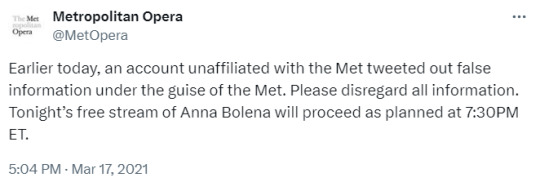
i regularly think back on this as one of the funniest things to ever happen on twitter which sounds like and overstatement but im actually ctfu writing this rn remembering watching the whole thing unfold in real time in the basement in my old place lmao
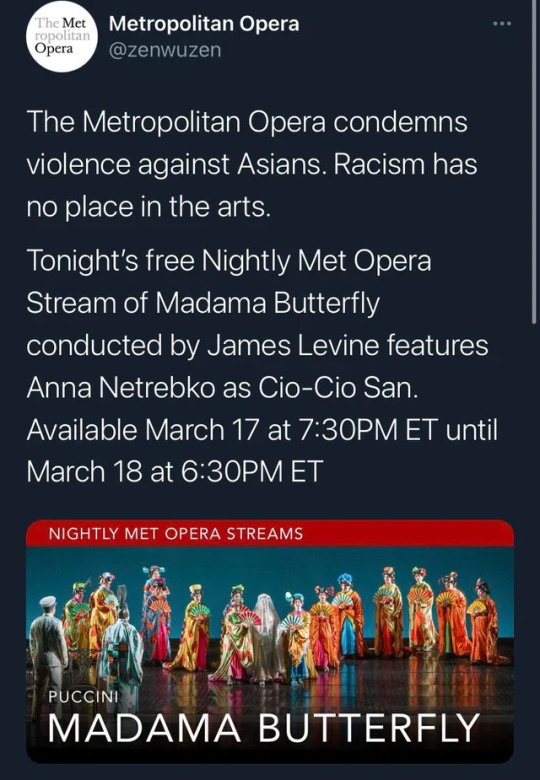
re: last reblog also lmfaooo remember this ............... one of the greatest moments in asian american history
81 notes
·
View notes
Text
Chapter 5. (Fieldwork)
Racialization: the textbook defines racialization as, The process of categorizing, differentiating, and attributing a particular racial character to a person or group of people.
For example, the media paints the African American male to be a savage by their overrepresentation of violent crime. Because of this, many people who aren't black (and even some who are) become uneasy around African Americans because they think they could pop off and go feral at any second. The overrepresentation of violent crime committed by African Americans is not only destructive to those being held responsible, but for the entire community as well; Stereotypes can not only be created, but also enforced by this negative aspect of media.
(https://www.americanprogress.org/article/dangerous-racialization-crime-u-s-news-media/)
White Privilege: White privilege is essentially the unfair advantage that white American citizens hold all other ethnic groups, simply because of the color of their skin.
White privilege is still alive to this day despite the claims of many white people arguing that it doesn't, and never existed. One criterion where white privilege is abundantly clear lies within police interaction. In the past decade we've seen countless times in the news how unarmed black men have been shot, tazed, and choked to death for misdemeanor and minor felony offences. Last year in July (2022) a 25 year old unarmed black man later identified to be Jayland Walker was shot dead by 8 police officers after fleeing. Bodycam footage displayed Walker running away from a traffic stop, obviously unarmed, before all 8 officers discharged their firearms into his back killing him on the scene. Just a year prior to this event, a white man named Robert Aaron Long went on a murder spree in Atlanta Georgia, targeting and killing people of Asian descent. Long was apprehended, given a fair trial, and sentenced to life without parole with an additional 35 years. In the end, Long's life was taken from him in a sense that he had to spend the rest of it behind bars, whereas Walker didn't get the opportunity to be tried in a courtroom. Excessive force and malice is seldom used against a white suspect even if all fingers point to them committing the crime.
(https://www.npr.org/2021/09/28/1041137210/atlanta-spa-shooting-suspect-pleads-not-guilty-robert-aaron-long)
(https://abcnews.go.com/US/black-man-unarmed-ohio-officers-opened-fire-family/story?id=86149929)
Microaggression: refer to common everyday verbal or behavioral indignities and slights that communicate hostile derogatory and negative messaged about someone's race, gender, sexual orientation, or religion.
Prior to the 2021 election, Joe Biden made a few questionable statements, some of which regarding the race and racial identity of African Americans. In one instance, Biden is being interviewed by Charlamagne and says, "If you have a problem figuring out whether you're for me or Trump, the you ain't black". This statement stirred up a lot of controversy due to the fact that it offended many individuals who are black and unsure of who to vote for. Although the statement was not made to be intentionally offensive, Biden was under fire nonetheless.
Racism: individuals thoughts and actions, as well as institutional patterns and policies, that create or reproduce unequal access to power, privilege, resources, and opportunities based on imagined differences among groups
After the abolition of slavery and the riddance of Jim Crow laws, racism remains to linger in the United States. In 2020, a black man was bird watching in New York City's Central Park when he confronted a women walking her dog. Christian Cooper (bird watcher) asks Amy Cooper (dog walker) [no relation] to follow park rules and leash her dog. Amy cooper then calls the Police and tells them that there is an African American male threatening her life; Christian cooper records the interaction. While Amy Cooper's intentions were not clear, it can be inferred from the video that she was using the police as a weapon against Christian. The video was uploaded on May 27th 2020, 2 days after George Floyd was killed by police officers in Minneapolis.
youtube
0 notes
Text
hey, in light of the hate crimes in atlanta, i decided to make a thread about my experiences about what i’ve faced as an asian woman in america. https://twitter.com/petaisbough/status/1372286490978492423?s=21 pls boost and share; asian voices deserve to be heard and listened to during this time. our community in the states is constantly under attack, especially because of misinformation and stereotyping this year.
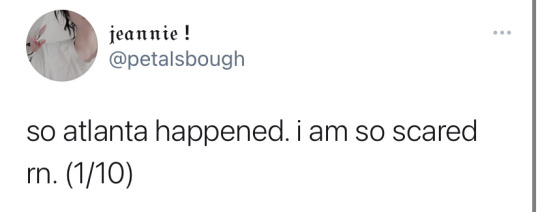
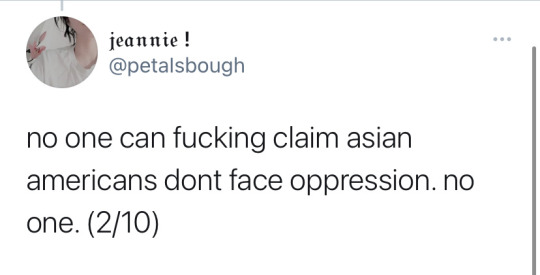
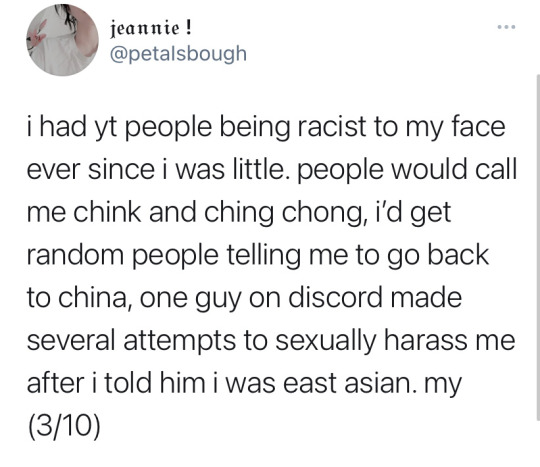


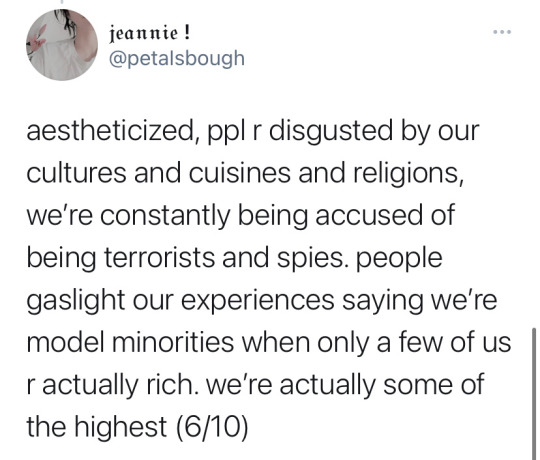
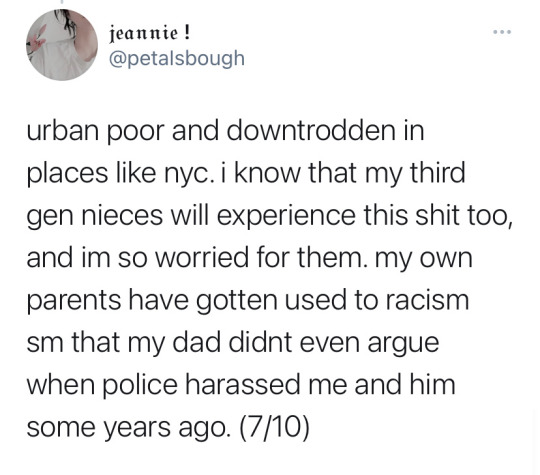
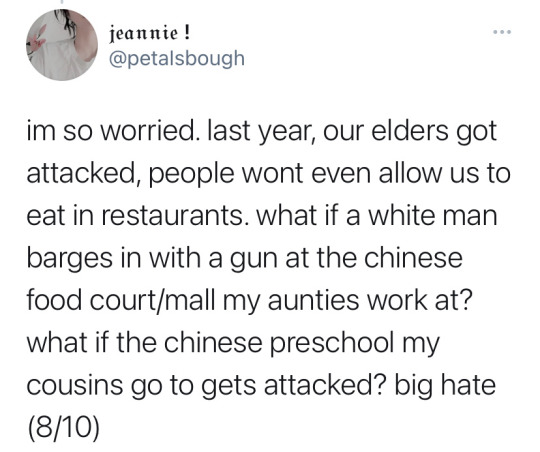


here are some charities you can donate to help us:
• red canary song — a transnational grassroots organization that works to help migrant asian sex workers
• asian immigrant women advocates — works with low income immigrant youth and workers in the san francisco bay area, seeks to empower them through education, leadership development, and collective action
• womankind — a charity that provides resources for immigrant asian woman who are survivors of domestic abuse
• asian american journalism organization — nonprofit working to ensure fair coverage of asians and asian issues in news media, as well as bring more asian diversity into newsrooms
• asian americans advancing justice — an advocacy/rights group for asian diaspora in the states, currently have an atlanta chapter
• butterfly asian and migrant sex workers support network — advocates for the rights of asian immigrant sex workers, based in toronto
#*#mine#asian american#chinese#asiansarehuman#asian voices#coronavirus#hate crimes#atlanta#atlanta spa shootings (2021)#signal boost#news#asian diaspora
523 notes
·
View notes
Text
youtube
“Rising Against Asian Hate:” Son of Atlanta Spa Shooting Victim Speaks Out, October 18, 2022
The horrific spa shootings that rocked Atlanta in 2021 left eight people dead -- including six Asian women -- and an Asian American community shrouded in grief and fear. A new documentary on PBS.org, "Rising Against Asian Hate," explores the story in searing detail. Executive producer Gina Kim and Robert Peterson -- whose mother was killed in the shootings -- join Hari Sreenivasan to discuss the tragedy and its aftermath.
Amanpour and Company
#amanpour and company#pbs#Rising Against Asian Hate#Gina Kim#Robert Peterson#Atlanta#2021 Atlanta spa shootings#guns#racism#bias#discrimination#objectification#violence#sexism#documentary#hate crime#USA#film#relevant#Youtube
3 notes
·
View notes
Text
Black Twitter reacts to white man killing Asian women in Atlanta
People of color are coming together in support of the Asian community after Robert Aaron Long killed eight people, including six Asian women, in Atlanta.
People of color are coming together in support of the Asian community after Robert Aaron Long killed eight people, including six Asian women, in Atlanta.
On Tuesday night (March 16), eight people, including six Asian women, were killed at three separate massage parlors in Atlanta. Robert Aaron Long was arrested in connection to the fatal shootings, and the Asian community as well as other communities of color who identify with being victims of discrimination expressed their outrage on social media.
“Makes me sick. These women deserved their lives. No one should be targeted or murdered because of their ethnicity,” one person wrote. “This trashy person is Robert Aaron Long. Praying for the families of these victims.”
Another Twitter user penned, “THIS GUY JUST SHOT 12 AND KILLED 8 ASIAN AMERICANS, and there’s not a SCRATCH on him.. he’s not Shot to Death from what I can see… I don’t see any CHOKE HOLD MARKS or BRUISES… THIS IS SOME BUUUUULLLLL%#@*!!!!!”
Former president Barack Obama chimed in on the conversation, writing, “Even as we’ve battled the pandemic, we’ve continued to neglect the longer-lasting epidemic of gun violence in America. Although the shooter’s motive is not yet clear, the identity of the victims underscores an alarming rise in anti-Asian violence that must end.”
He continued, “Yesterday’s shootings are another tragic reminder that we have far more work to do to put in place commonsense gun safety laws, and root out the pervasive patterns of hatred and violence in our society.”
Amid the plethora of social media posts, many warned against the use of the hashtag Asian Lives Matter, which takes away from the Black Lives Matter movement. #StopAsianHate and #RacismIsNotComedy were suggested as better alternatives.
While many considered the shootings a discriminatory act against the Asian community, Long told officers that he targeted the spa parlors because of his sexual addiction, explaining they represented a “temptation he wanted to eliminate.”
”During his interview, he gave no indicators that this was racially motivated,” Cherokee Sheriff Frank Reynolds said Wednesday (March 17). “We asked him that specifically, and the answer was no.”
Long admitted he had plans to travel to Florida and commit similar crimes, but with help from the suspect’s family, the 21-year-old was caught and taken into police custody. He is being held on four counts of murder and one count of aggravated assault.
Makes me sick. These women deserved their lives. No one should be targeted or murdered because of their ethnicity. This trashy person is Robert Aaron Long. Praying for the families of these victims. #AsianLivesMatterpic.twitter.com/tfSbnbR2VX — Jaywayz (@Jaywayz_21) March 17, 2021
THIS GUY JUST SHOT 12 AND KILLED 8 ASIAN AMERICANS and there’s not a SCRATCH on him.. he’s not Shot to Death from what I can see… I don’t see any CHOKE HOLD MARKS or BRUISES… THIS IS SOME BUUUUULLLLL%#@*!!!!! #BlackLivesMatter#AsianLivesMatter ✊#Atlanta ( This is the dif’) pic.twitter.com/GLq1xUtoZX — K. Lang 💎 (@SkyviewKevin) March 17, 2021
hi everyone. speaking on behalf of the asian community, please do not use the #AsianLivesMatter hashtag! it derives it’s name from the black lives matter movement, another separate movement. here are some alternatives you can use! — prim | blm and protect asian lives (@whorefory0han) March 17, 2021
Even as we’ve battled the pandemic, we’ve continued to neglect the longer-lasting epidemic of gun violence in America. Although the shooter’s motive is not yet clear, the identity of the victims underscores an alarming rise in anti-Asian violence that must end. — Barack Obama (@BarackObama) March 17, 2021
Michelle and I pray for the victims, their families, everyone grieving these needless and devastating killings—and we urge meaningful action that will save lives. — Barack Obama (@BarackObama) March 17, 2021
Mayor @KeishaBottoms‘ statement on the overnight shootings in Atlanta. pic.twitter.com/sJjINpG1jn — City of Atlanta, GA (@CityofAtlanta) March 17, 2021
8 lives were violently stolen. We stand in solidarity & deep compassion w/ our AAPI family in Georgia & across the country. Racism, misogyny, & white supremacy are a threat to all of our communities, and we must call out the targeted, violent attacks on our AAPI neighbors. — Ayanna Pressley (@AyannaPressley) March 17, 2021
Sent from my iPhone
I will never forgive the cop who said that murderer had a bad day and a sex addiction
Raise your hand if you had bad days and/or sex addiction and never in your life killed anyone

I’m not a sex addict but I had bad days but I’ll tell you what I’m not grabbing my ak and killing people
1 note
·
View note
Text
People are defending Baker and why what he said wasn’t that bad.
Let’s be clear. It was.
And is anyone shocked he’s shared anti-Asian racist nonsense? I didn’t think so.
#tw: hate crime#atlanta spa shootings (2021)#asian hate crimes#our police are a big part of our problem
1 note
·
View note
Link

By BY JULIANA KIM from U.S. in the New York Times-https://www.nytimes.com/2021/06/10/us/atlanta-shooting-victims.html?partner=IFTTT Randy and Eric Park’s mother was among eight people killed in the spa shootings. They have been largely left to navigate the world by themselves. ‘She Died Working for Us’: Sons of Atlanta Victim Struggle to Move Forward New York Times
0 notes
Text
Names of the Victims in the Atlanta Spa Shootings
Soon Chung Park, 74;
Hyun Jung Grant, 51;
Suncha Kim, 69;
Yong Ae Yue, 63
Xiaojie “Emily” Tan, murdered two days before her 50th birthday;
Daoyou Feng, 44;
Delaina Ashley Yaun, 33;
Paul Andre Michels, 54
Elcias R. Hernandez-Ortiz, 30, was injured in the shooting and remained in critical condition as of March 18, 2021.
(In case someone else cares more about the victims than about yet another racist domestic terrorist.)
1K notes
·
View notes